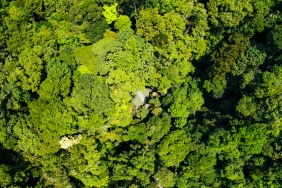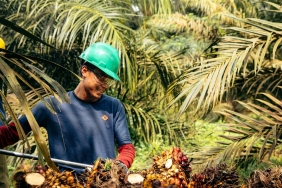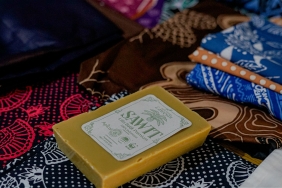INDIGENOUS PEOPLE OF KAMPUNG ASAI, YAPEN, PAPUA AGREE TO DO TASAMU RAWANANG IN THE WATER AREA
Asai, Kep. Yapen, Papua, August 29, 2022- The indigenous people of Asai village, consisting of the Kewari, Abubar, Puari and Raubia clans, agreed to conduct Tasamu Rawanang. Tasamu Rawanang in the Asai language means "Pele Laut" to carry out sustainable natural resource management. Tasamu Rawanang is a form of traditional conservation rooted in the culture of the Asai village indigenous people, in practice from today until June 22, 2024 the community agreed to protect and not take natural resources at the location of the agreement.
The Tasamu Rawanang area has an area of about 284 hectares consisting of the Kewari clan 81 hectares, Abubar 56 hectares, Puari 140 hectares and Raubia 7 hectares, it has been agreed that fishing restrictions will be carried out in the area which will begin on August 29, 2022 to August 29, 2023, this fishing restriction aims to restore the natural resources around the waters of Asai Village.Also present at this traditional ceremony were all the people of Kampung Asai, Representatives of the 4 Great Clans of Kampung Asai and Representatives of the Windesi District Government and the Asai Village Government.
According to Abubar, an indigenous person in Asai Village, "Tasamu was originally used by the people of Asai Village to limit the taking of natural resources in the forest". Abubar further revealed, "So there are Tasamu of areca nut, mango, rambutan and coconut trees, the purpose is to save them in nature so that they can be fully utilized later".
While Tasamu in the sea is a local rule that was first implemented in the waters by crossing bamboo as a symbol of prohibition to take marine products such as small fish, shells, corals, and other marine biota within a specified period of time. Before the sea bagamu was established, in April 2022, the WWF Indonesia Foundation first provided training on monitoring and data collection of water conditions to fishermen. This was done by collecting data on coral reef cover, counting the number of fish found along the observation transect, and interviewing fisher households regarding their perceptions of the condition of fisheries in Kampung Asai over the past 5 years.
The results of the monitoring training with fishermen, 30% of the condition of live coral was damaged, the condition of megabenthos (clams and sea cucumbers) began to decrease in the waters of Kampung Asai. According to Matheis Kewari, one of the indigenous people in Asai village, fishermen's fish catches in the last five years have continued to decline. Matheis said, "The sasi closure activity or Tasamu Rawanang should have been carried out 5-6 years ago so that the condition of the waters of Asai village is maintained," he said.
The Tasamu Rawanang agreement was also born from a collaborative discussion process at the clan level in Asai village and surrounding village communities in Windesi District with the Yapen Islands Regency Government, including BAPPEDA, the Maritime and Fisheries Service, the Village Community Empowerment Service and Fisheries Extension Officers. From the discussion process, it was found that fishing practices that were not environmentally friendly such as taking fish using tuba roots or commonly called bobato, the use of compressors and potassium.
Meanwhile, Maklon Sineri, S.Pi, the Asai Village Extension Coordinator from the Ministry of Maritime Affairs and Fisheries strongly agrees with what has been done by the Asai village community, "I am ready to assist in the issuance of Marine and Fisheries business cards or e-KUSUKA for Asai Village Fishermen and support fishery product processing training activities".
Wika A. Rumbiak, Papua Program Manager, WWF Indonesia Foundation at the closing ceremony of Tasamu Rawanang said that in Papua, there are many types of traditional conservation with various designations, such as Kadup in wondama Bay, Nat Gato Tom Fowa on the coast of Tambrauw to Tasamu Rawanang in Asai village. Wika further explained, "In addition to providing technical support such as methods and techniques for monitoring fisheries and marine resources, we also support the revitalization or strengthening of local values that are strong in the community. so that these groups connect with each other and find effective local solutions for sustainable, resilient and collaborative management with local governments, universities, development partners and indigenous peoples", concluded Wika.
For more information please contact :
Simon Bonai - Head of Windesi District, Yapen Islands Regency, Hp; 0822-3912-2222
.
● Ruben Rumbiak, Community Development Officer Yapen, WWF Indonesia Foundation Papua Program Email: rrumbiak@wwf.id -Hp; 0812-4022-2485
● Ros Weyai, Communication Officer, Yayasan WWF-Indonesia Papua Program |Email: rweyai@wwf.id - Phone: 0822-3903-3227





